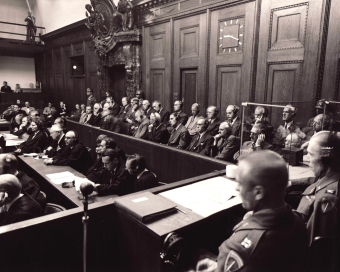The Charges in the I.G. Farben Trial in Nuremberg (Case VI)

© National Archives, Washington, DC
In 1947, subsequent to the so-called Trial of the Major War Criminals in Nuremberg, United States v. Carl Krauch, et al.—the Farben case—was tried before Military Tribunal VI, which was constituted on August 8, 1947. Designated as judges were Curtis Grover Shake, James Morris, Paul Macarius Hebert, and Clarence F. Merrell. Since December 1946, the prosecution’s team, consisting of Josiah E. Dubois, Drexel A. Sprecher,[1] and Emanuel Minskoff, had been engaged in research for the bill of indictment charging top managers of I.G. Farbenindustrie AG. In this process, they relied principally on documents collected by U.S. government departments and intelligence services, and on the extensive statements and papers put on record by I.G. Farben’s managing board members Hermann Schmitz, Georg von Schnitzler, and Max Ilgner for Bernard Bernstein’s investigative team in summer 1945. Using these materials, the 12 members of prosecution counsel tackled the difficult task of proving the individual guilt of key executives of I.G. Farben: Numerous documents had been duly put aside; “too many witness statements were unsworn, too many legal papers were undated.”[2] The indictment, dated May 8, 1947, finally charged 24 managers at I.G. Farben with having committed one or more of the following crimes:
1. Planning, preparation, initiation, and waging of wars of aggression
2. Plunder and spoliation in the annexed and occupied countries
3. Participation in the slave labor program and policy of genocide of the Nazi dictatorship
4. Membership in criminal organizations
5. Common plan or conspiracy to commit crimes against peace
Counts one, three, and five were a novelty in the history of law: they referred to elements of offense that were argued before a court for the first time in the Nuremberg Trials. Charged in addition to Carl Krauch, the chairman of the supervisory board and first-named defendant, were his managing board colleagues Otto Ambros, Max Brüggemann, Ernst Bürgin, Heinrich Bütefisch, Fritz Gajewski, Paul Häfliger, Heinrich Hörlein, Max Ilgner, Friedrich Jähne, Hans Kühne, August von Knieriem, Carl Ludwig Lautenschläger, Wilhelm R. Mann, Heinrich Oster, Hermann Schmitz, Christian Schneider, Georg von Schnitzler, Fritz ter Meer, and Carl Wurster, as well as the two directors Walther Dürrfeld and Heinrich Gattineau and the two executives Erich von der Heyde and Hans Kugler. The case as to the defendant Max Brüggemann, the concern’s chief legal advisor, was withdrawn shortly after the beginning of the main trial.
(SP; transl. KL)
















